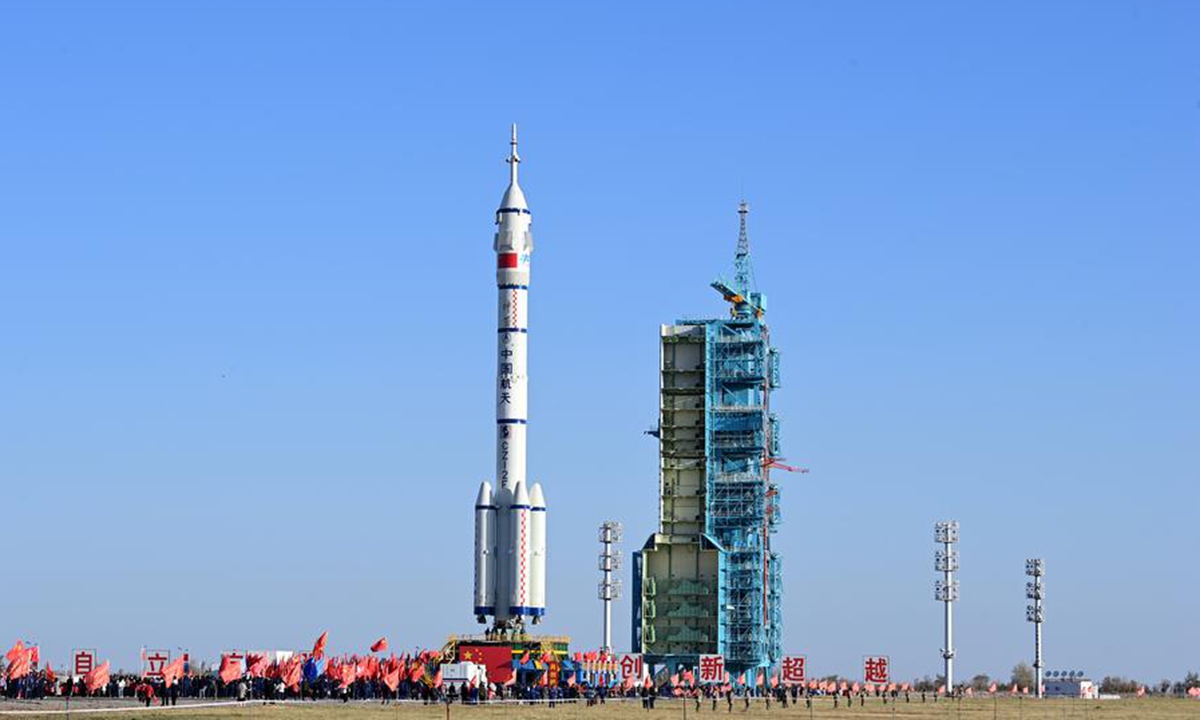
Photo: Xinhua
On a Tuesday morning, a press conference on the Shenzhou-19 crewed spaceflight mission was held at the Jiuquan Satellite Launch Center. It was announced that China aims to launch the Shenzhou-19 crewed spaceship at 4:27 am on Wednesday, with preparations steadily progressing.
The flight crew, consisting of three taikonauts, made their first public appearance. This marks the fourth manned mission during the application and development stage of China's space station, and the 33rd flight mission of China's manned space program.
People could see that China's manned space program is advancing steadily according to its "Three-step Strategy," reflecting not only the dedication and ingenuity of Chinese scientists, but also humanity's collective yearning for space exploration.
One of the main objectives of this mission is to complete an in-orbit rotation with the Shenzhou-18 trio and stay at the space station for approximately six months, during which various experiments will be conducted. During their stay, the Shenzhou 19 crew will receive visits from the Tianzhou-8 cargo ship and the Shenzhou-20 crewed spaceship.
This demonstrates that China's Shenzhou manned system and Tianzhou cargo system can ensure reliable and stable round-trip transportation for personnel and supplies between Earth and the space, while the Tiangong space station is equipped with abundant resources and comprehensive facilities. The stable operation of these three components has created a complete closed loop, which indicates that future Chinese space missions will be frequent, with deeper explorations and greater achievements anticipated.
"Will the next human to walk on the Moon speak English or Mandarin?" asked a recent commentary on the Australian website The Conversation. In fact, lunar exploration is both a competition and a collaboration, and China is creating an excellent platform for international cooperation.
Just as a spokesperson for the Chinese manned space program stated at the press conference on Tuesday, the China Manned Space Agency welcomes its international counterparts to join in the flight missions of the country's space station. Since the inception of its manned space program, China has been engaging in international exchanges and cooperation. As of November 2023, China had signed over 150 intergovernmental space cooperation agreements with more than 50 countries and international organizations. The growth of China's space endeavors relies significantly on equal collaboration and inclusive mutual learning, which are essential components of its "international payload."
China continues to promote its space achievements to benefit the world, especially developing countries. On one hand, with its lunar exploration and other space research programs, China has strengthened cooperation with developing countries in regions like Africa and Latin America, and supported the space capacity building of developing countries through various means.
On the other hand, China consistently shares its achievements with the international community. For instance, China has distributed lunar samples to over 100 research teams, initiated multilateral projects such as the BRICS Remote Sensing Satellite Constellation and the Belt and Road Initiative Space Information Corridor. Medicinal plant seeds brought back from the Tiangong space station are being experimentally cultivated in Pakistan; the China-Brazil Earth Resources Satellite aids in preserving the Amazon rainforest ecosystem; and the Fengyun meteorological satellites provide weather monitoring, forecasting, and disaster response services to over 120 countries and regions. China's steady and practical approach contributes to building a community with a shared future in outer space.
The focus of the international mainstream media on China's space program has also changed. Besides marveling at China's technological innovations, there is less emphasis on the "China space threat" narrative, with such voices now considerably quieter. This is an inevitable result of China's space achievements benefiting the world more and more.
People have noted that the US "Wolf Amendment" has restricted its own actions, and there are growing calls within the US space industry for cooperation with China. In an article this August, American magazine Foreign Policy also called for US-China partnership in space. Given that space exploration is long-term, costly, and challenging, humanity will be stronger by creating an open and cooperative "circle of friends" rather than a closed "club" of solitary efforts - an idea that is easily understood.
Recently, China released Space Science Development Program for 2024-2050, setting a roadmap for its space science growth through 2050. Exploring the mysteries of the universe and utilizing outer space is a common dream of all humanity. In the future, with the rapid development of China's space resources and technological capabilities, especially with the successful completion of manned lunar missions, China's space endeavors will continue to embrace openness and deepen various forms of international cooperation in space. China will continue to promote international space exchanges and cooperation in various forms with an open mind, share development achievements with other countries, improve outer space governance, and make space scientific and technological achievements more beneficial to mankind, so that the wisdom of mankind with a shared future will be ventured into the vast expanse of space.




